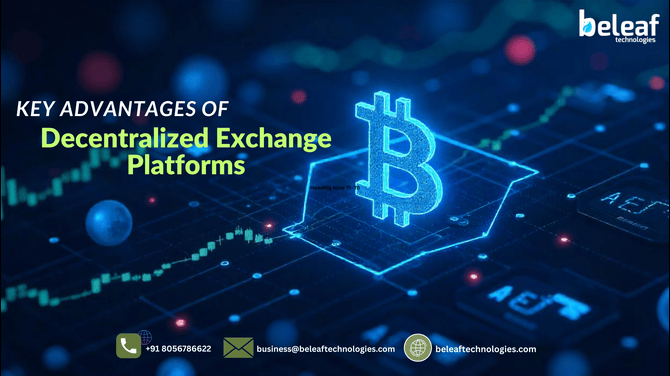Decentralized exchanges (DEXs) have become a pivotal innovation in the world of cryptocurrency trading. Unlike traditional centralized exchanges, DEX platforms operate without a central authority, allowing users to trade directly with each other. This shift offers numerous advantages that appeal to traders, developers, and businesses alike. In this blog, we explore the key benefits of decentralized exchange platforms, explaining why they are gaining traction in the crypto ecosystem.
1. How Decentralized Exchanges Offer Better Security and Control
One of the most significant advantages of decentralized exchanges is enhanced security. Centralized exchanges hold users’ funds in custody, which means users must trust the platform to safeguard their assets. This setup has historically led to high-profile hacks and thefts, where millions of dollars worth of cryptocurrencies were stolen.
In contrast, decentralized exchanges allow users to retain control of their private keys and funds at all times. Trades occur directly from user wallets, eliminating the need to deposit funds into a third-party platform. This significantly reduces the risk of large-scale theft or fraud since there is no central point of failure. For users, this means greater peace of mind and a safer trading environment.
2. Why Users Prefer Decentralized Platforms for Privacy and Trust
Privacy is a core principle in the crypto world, and decentralized exchanges cater to this demand better than centralized platforms. Many centralized exchanges require users to complete extensive Know Your Customer (KYC) processes, collecting personal information that some traders prefer to keep private.
DEXs typically allow users to trade anonymously or with minimal personal data, since they operate on blockchain networks where transactions are verified through smart contracts. This trustless environment removes the need to rely on a middleman or share sensitive information. For privacy-conscious users, decentralized exchanges offer a way to trade freely while maintaining anonymity and control over their data.
3. The Main Benefits of Trading Without Intermediaries
Traditional exchanges act as intermediaries between buyers and sellers, which introduces additional fees, delays, and the potential for manipulation. Decentralized exchanges remove this middleman by enabling peer-to-peer trading directly on the blockchain.
This peer-to-peer model offers several benefits:
-
Lower trading fees, since there is no central operator taking a cut.
-
Faster transaction settlements, as trades execute automatically through smart contracts.
-
Reduced risk of censorship or account freezing, because no central entity controls user funds.
By cutting out intermediaries, decentralized exchanges provide a more efficient and transparent trading experience.
4. How Decentralized Exchanges Improve Transparency and Reduce Risks
Transparency is a hallmark of blockchain technology, and decentralized exchanges leverage this to build trust among users. All transactions and trades on a DEX are recorded on a public blockchain, which anyone can audit at any time. This openness helps eliminate concerns about market manipulation, order book falsification, or hidden fees issues that sometimes plague centralized platforms.
Moreover, because users maintain control of their funds, the risk of losing assets due to exchange insolvency or mismanagement is greatly reduced. Traders on decentralized platforms benefit from a level of transparency and security that builds confidence in the system and encourages wider adoption.
5. Simple Reasons Why Decentralized Exchanges Are Gaining Popularity
The popularity of decentralised exchanges is rising quickly for a number of simple reasons:
-
User empowerment: DEXs give users control over their assets and trades without relying on centralized parties.
-
Global access: Anyone with an internet connection can access a decentralized exchange without restrictions or geographic limitations.
-
Innovation: Many DEX platforms support advanced features like liquidity pools, yield farming, and token swaps, attracting DeFi enthusiasts.
-
Censorship resistance: Decentralized exchanges operate without centralized control, making them resistant to shutdowns or government interference.
These factors combined make decentralized exchanges appealing for a wide range of users, from casual traders to institutional investors.
6. Benefits of Decentralized Exchanges for Both Users and Businesses
Decentralized exchanges aren’t just advantageous for individual traders; they also offer benefits to businesses and developers For businesses, DEXs provide access to a broader and more diverse user base without the have to follow several legal requirements that are typically associated with centralised systems.
For developers and startups, decentralized exchange technology offers an open, composable framework. This means new applications can be built on top of existing DEX infrastructure, fostering innovation in decentralized finance (DeFi) and other blockchain-related industries.
Moreover, by supporting decentralized exchanges, businesses can promote greater financial inclusion, offering services to unbanked or underserved populations worldwide.
Conclusion
The way cryptocurrency trading functions has undergone a radical transition thanks to decentralised exchange platforms. By offering better security, enhanced privacy, elimination of intermediaries, increased transparency, and broad accessibility, DEXs address many challenges faced by traditional exchanges. As the crypto market matures, decentralized exchanges will continue to play a crucial role in creating a more open, secure, and efficient financial ecosystem for users and businesses alike.
Whether you are a trader seeking greater control over your assets or a business exploring blockchain innovation, understanding the advantages of decentralized exchange platforms is essential for staying ahead in the rapidly evolving crypto landscape.


